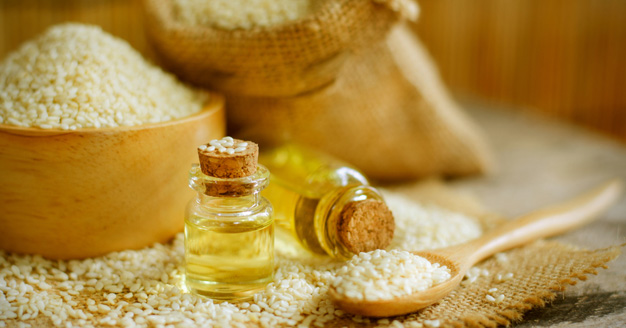Sesame Seed Oil May Reduce Breast Cancer Risk by 42%

Sesame seeds are used as a topping for so many breads, buns, crackers and other baked goods that most people don’t even realize they are consuming these seeds on a regular basis. Most people also don’t realize that sesame contains anticancer compounds similar to those found in flax seed. They’re called lignans, and the lignans unique to sesame are called sesamin and sesamolin. And just as flax seed consumption has been linked to reduced breast cancer risk, sesame seed now also appears to substantially reduce risk—but at much higher levels of consumption than just a sprinkling on your bread.
The Lignan – Breast Cancer Connection
Lignans are a special class of polyphenols with powerful antioxidant and anti-oestrogenic effects. And they do much more than just blocking the action of excess oestrogen. Lignans have been observed to directly suppress and even kill breast cancer cells in lab studies. In particular, sesamin was found to reduce the viability of human breast cancer cells up to 70% by blocking a key protein in cancer cells known as nuclear factor kappa-B. So it’s no surprise that diets high in lignans have been linked to lower risks for breast cancer. For example, a recent study from Canada found that postmenopausal women eating flax seeds regularly had 28% less breast cancer. But dosage was key. And the dosage needed for this level of risk reduction was 5 mg of lignans daily. That’s not easy to get. The typical Western diet provides only about 1 mg of lignans daily.
Sesame Oil: Lignan Superfood
The best food sources for lignans are whole grains, nuts and seeds. But these typically only provide about 0.25 to 1 mg of lignans per 100 grams of food. Far higher levels are found in the two super-sources of lignans: flax seeds (335 mg per 100 grams) and sesame seeds (130 to 600 mg per 100 grams). But there is a key difference between the two. Those familiar with flax seed know that flax oil contains virtually zero lignans. That’s because flax lignans are water soluble and can’t dissolve in oil. The only way to get flax lignans into the oil is to include finely milled seeds. But the opposite is true of sesame seed lignans. In fact, they are found in even higher concentrations in the oil than in whole seeds. Just one teaspoon of virgin sesame seed oil has about 25 mg of lignans while a teaspoon of roasted sesame seed oil has about 35 mg of lignans (the roasting process helps to liberate more lignans from the seeds). So even a quarter teaspoon easily meets the 5 mg requirement of daily lignan intake for a meaningful reduction in breast cancer risk. At least, that’s the theory. What about in practice?
Sesame Oil and Breast Cancer Risk: 42% Risk Reduction with Regular Use
Sesame seed oil is commonly used in Chinese cooking to add flavor. And a recent study from China found that women who used the oil regularly in their cooking had 42% less breast cancer risk compared to those who never used the oil. The researchers in the study didn’t ask for exact quantities. But from the above analysis it’s clear that even a dash of sesame seed oil would provide a meaningful amount of lignans. Whether you use sesame oil in stir fry, as a marinade or on salads, just a little (one teaspoon) every day may provide substantial protection from breast cancer.
The Alternatives: Tahini and Hummus
For those who don’t like the taste of sesame seed oil, there are alternatives. Tahini is made of roasted and ground sesame seeds and therefore has quite a different taste from the pure oil. Tahini also contains about 33 mg of lignans per teaspoon (or 5 grams) so only a small amount is enough. One easy way to get tahini is in hummus, which is usually about 15% tahini by weight (check the label). At that level of tahini, every gram of hummus would provide about 1 mg of lignans. And that would mean that a 25-gram serving of hummus would have roughly 25 mg of lignans—a very rich source!
Eating a variety of foods is always a good idea, and the same goes for lignan superfoods. Studies have directly linked lower breast cancer risk to the consumption of both flax seed and sesame seed oil but we don’t yet know which is best, or if they act in such different ways that they are best used together. If you can’t get both in your regular diet, sesame seed oil use in cooking or hummus may be the easiest way to get enough lignans to make a difference.
Sources for this article include:
- https://www.ncbi.nlm.nih.gov/pubmed/20460401
- https://www.ncbi.nlm.nih.gov/pubmed/15668480
- https://onlinelibrary.wiley.com/doi/abs/10.1002/ejlt.200700057
DISCLAIMER: All information on this website, including research articles, is for information purposes only and is not meant as a recommendation to buy or use any nutritional supplement, healthcare product or service of any type. Ethan Evers does not provide medical advice directly or through recommended or linked materials, articles etc. All matters regarding your health require medical supervision and advice from an appropriately licensed medical practitioner.





